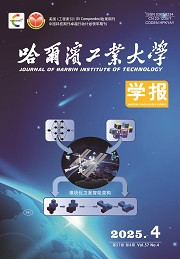| 引用本文: | 杨浩志,辛艳青,郑小龙,石倩,代明江,林松盛,孙珲.结构调制高硬度TiCu/TiN-Cu纳米多层复合膜制备及其机械性能[J].哈尔滨工业大学学报,2021,53(8):56.DOI:10.11918/202001059 |
| YANG Haozhi,XIN Yanqing,ZHENG Xiaolong,SHI Qian,DAI Mingjiang,LIN Songsheng,SUN Hui.Preparation and mechanical properties of structure modulated TiCu/TiN-Cu nano-composite multilayer films[J].Journal of Harbin Institute of Technology,2021,53(8):56.DOI:10.11918/202001059 |
|
| |
|
|
| 本文已被:浏览 875次 下载 1245次 |

码上扫一扫! |
|
|
| 结构调制高硬度TiCu/TiN-Cu纳米多层复合膜制备及其机械性能 |
|
杨浩志1,辛艳青2,郑小龙1,石倩3,代明江3,林松盛3,孙珲2
|
|
(1.山东大学(威海) 超级计算中心,山东 威海 264209;2.山东大学 空间科学与物理学院,山东 威海 264209;3.广东省现代表面工程技术重点实验室(广东省新材料研究所),广州 510651)
|
|
| 摘要: |
| 为改善TiN硬质薄膜的硬度和耐摩擦磨损性能,采用多弧离子镀技术,在硬质合金基底上制备了单层TiN-Cu薄膜和调制周期Λ=5.9~62.1 nm的5组TiCu/TiN-Cu纳米多层复合膜。使用扫描电子显微镜(SEM)、X射线能谱仪(EDS)、X射线衍射仪(XRD)、纳米压痕仪、划痕仪和摩擦磨损试验机等测试仪器,表征了薄膜的微观结构及机械性能,并研究了调制周期对纳米多层复合膜结构及机械性能的影响。实验结果表明:与单层TiN-Cu薄膜相比,TiCu/TiN-Cu纳米多层复合膜有效地抑制了晶粒生长,而且分层明显,薄膜均匀致密,薄膜中TiN晶粒以面心立方结构沿(111)方向生长。随着调制周期的减小,薄膜的结晶性有所下降,薄膜的硬度呈现先增大后减小的趋势。在调制周期为13.7 nm时,薄膜综合性能达到最佳,薄膜的硬度达到了42.6 GPa,H3/E2值也达到了0.689,摩擦系数为0.17,附着力为49.2 N,接近53.1 N的最高值,表明薄膜具有理想的硬度和耐摩擦磨损能力。在使用多弧离子镀工艺制备TiCu/TiN-Cu纳米多层复合多层膜的过程中,通过调整调制周期,有效地改善了膜层的机械性能,拓展了膜层的应用范围。 |
| 关键词: 多弧离子镀 纳米多层复合膜 TiN-Cu 调制周期 机械性能 |
| DOI:10.11918/202001059 |
| 分类号:TG178 |
| 文献标识码:A |
| 基金项目:国家自然科学基金(62004117); 中国博士后基金面上项目(2019M651199); 山东大学(威海)青年学者未来计划; 广东省现代表面工程技术重点实验室开放课题 |
|
| Preparation and mechanical properties of structure modulated TiCu/TiN-Cu nano-composite multilayer films |
|
YANG Haozhi1,XIN Yanqing2,ZHENG Xiaolong1,SHI Qian3,DAI Mingjiang3,LIN Songsheng3,SUN Hui2
|
|
(1.Supercomputing Center, Shandong University, Weihai 264209, Shandong, China; 2.School of Space Science and Physics, Shandong University, Weihai 264209, Shandong, China; 3.Key Lab of Guangdong for Modern Surface Engineering Technology (Guangdong Institute of New Materials), Guangzhou 510651, China)
|
| Abstract: |
| In order to improve the hardness and wear resistance of TiN films, single-layer TiN-Cu composite films and five groups of TiCu/TiN-Cu nano-composite multilayer films with modulation period (Λ) of 5.9~62.1 nm were prepared on cemented carbide substrates by multi-arc ion plating. The microstructures and mechanical properties of the films were characterized by scanning electron microscopy (SEM), energy dispersive X-ray spectroscopy (EDS), X-ray diffraction (XRD), nano-indentation tester, scratch tester, friction-wear tester, and other machines. The influences of modulation period on the structures and mechanical properties of the nano-composite multilayer films were studied. Results show that compared with the single-layer TiN-Cu composite film, the TiCu/TiN-Cu nano-composite multilayer film effectively inhibited the growth of the grains, the layer was well formed, and the film was uniform and dense. The TiN grains in the film grew in face-centered cubic structure along (111) direction. With the decrease of the modulation period, the crystallinity of the film reduced, while the hardness of the film increased first and then decreased. When the modulation period was 13.7 nm, the optimal comprehensive properties were achieved, where the hardness and H3/E2 value of the film reached 42.6 GPa and 0.689, the friction coefficient reached the minimum value of 0.17, and the adhesion was 49.2 N, closing to the maximum value of 53.1 N, indicating that the film possesses ideal hardness and wear resistance. Through multi-arc ion plating, the TiCu/TiN-Cu nano-composite multilayer films were prepared. By adjusting the modulation period, the mechanical properties of the films were effectively improved and the application domains were expanded. |
| Key words: multi-arc ion plating nano-composite multilayer film TiN-Cu modulation period mechanical properties |
|
|
|
|







